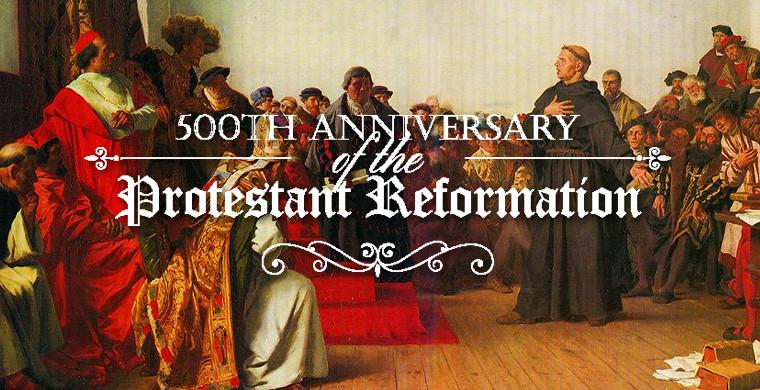Leading Protestant theologians offer a new confession on Reformation's 500th anniversary
CHICAGO (Sept. 12, 2017) -- A new Protestant confession commemorating the 500th anniversary of the Reformation and honoring the original vision of the reformers for catholic unity was released Tuesday, September 12.
The Reforming Catholic Confession is an opportunity for Protestants across denominations and around the world to come together in a united gospel-centered witness. The steering and drafting committees believe that despite genuine denominational differences, there is a significant and substantial doctrinal consensus that unites reformational Christians as "mere Protestants."
"This confession is not a charter for a new church but a tactical commemoration of the unitive Protestantism that characterized the Reformation at its best, a concrete witness to the fact that the theological truths that unite us are deeper and stronger than the doctrines that distinguish us," said Kevin Vanhoozer, research professor of systematic theology at Trinity Evangelical Divinity School and co-chair of the confession drafting committee.
The confession is organized around statements of belief on God the Trinity, Holy Scripture, human beings and their fallenness, the person and work of Jesus Christ, the gospel, the person and work of the Holy Spirit, the church, baptism and Lord's Supper, holy living and last things.
A 17-member committee drafted the confession, co-led by Vanhoozer and Jerry Walls, scholar in residence and professor of philosophy at Houston Baptist University. The confession's steering committee was co-chaired by Timothy George, dean of Beeson Divinity School of Samford University, and Timothy Tennent, president of Asbury Theological Seminary. Theologians across many denominations support the confession, including Anglican, Baptist, Free Church, Lutheran, Mennonite, Methodist, Nazarene, Pentecostal and Presbyterian. Their hope and prayer is "for ever greater displays of our substantial unity in years to come," as stated in the confession's introduction.
"The Reforming Catholic Confession celebrates the many distinctive Protestant voices and contributions to the church, yet also calls us to remember the underlying catholicity and shared faith which strengthens us all," Tennent said.
At launch, the confession had approximately 250 signatories representing scholars, theologians and church leaders around the globe, including Gwenfair Walters Adams, Henri Blocher, Matt Chandler, Darrell Bock, Charlie Dates, Robert Kolb, Benjamin A. Kwashi, Gilbert Meilaender, Russell Moore, Michael Oh, Alvin Plantinga, Karen Swallow Prior, Samuel Rodriguez, Philip Ryken, Geoffrey Wainwright and Amos Yong, to name a few.
"The Protestant Reformation was a clarion call on behalf of the gospel of Jesus Christ, a summons to biblical catholicity," George said. "500 years later its message of forgiveness and renewal is still urgent."
Christians around the world are encouraged to read and sign the confession at reformingcatholicconfession.com as an opportunity to unite in a joyful confession of common faith this Reformation year.
*****
Anglicans Back New Confession
The confession (see above) was launched with 250 initial supporters, included 15 Anglican leaders:
The following Anglican and Episcopal leaders signed A Reforming Catholic Confession, which launched online Sept. 12.
The Rev. Michael Bird, lecturer in theology, Ridley College, Melbourne, Australia
Douglas Groothuis, professor of apologetics and ethics, Denver Seminary
Wesley Hill, assistant professor of biblical studies, Trinity School for Ministry
The Rt. Rev. Paul Kibirech Korir, Bishop of Kapsabet, Kenya
The Most Rev. Benjamin A. Kwashi, archbishop, Ecclesiastical Province of Jos, Nigeria
The Rev. Gerald McDermott, Anglican chair of divinity, Beeson Divinity School, Birmingham
The Very Rev. Andrew Pearson Jr., dean, Cathedral Church of the Advent, Birmingham
The Rev. Ephraim Radner, professor of historical theology, Wycliffe College, Toronto
The Rev. Joel Scandrett, director, Robert E. Webber Center for an Ancient Evangelical Future, Trinity School for Ministry
The Rev. John Senyonyi, vice chancellor, Uganda Christian University
The Rev. Jacob Andrew Smith, rector, Calvary-St. George's, New York City
The Rt. Rev. George Sumner, Bishop of Dallas
John Stonestreet, president, Colson Center for Christian Worldview
The Rev. Tish Harrison Warren, co-associate rector, Church of the Ascension (ACNA), Pittsburgh
The Rev. John W. Yates III, rector, Holy Trinity Anglican Church, Raleigh, North Carolina
The confession affirms doctrines about God the Trinity, Holy Scripture, human beings and their fallenness, the person and work of Jesus Christ, the gospel, the person and work of the Holy Spirit, the church, baptism and the Lord's Supper, holy living, and last things.
"[T]he one, holy, catholic, and apostolic church is God's new society, the first fruit of the new creation, the whole company of the redeemed through the ages, of which Christ is Lord and head," the confession says. "The truth that Jesus is the Christ, the Son of the living God, is the church's firm foundation (Matt. 16:16-18; 1 Cor. 3:11). The local church is both embassy and parable of the kingdom of heaven, an earthly place where his will is done and he is now present, existing visibly everywhere two or three gather in his name to proclaim and spread the gospel in word and works of love, and by obeying the Lord's command to baptize disciples (Matt. 28:19) and celebrate the Lord's Supper (Luke 22:19)."














